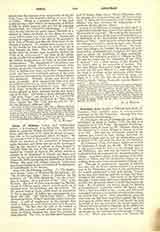

Jonathan (Hebrew: YHVNCHN or YVNHN = Yahweh hath given, cf. Theodore; September `Ionathan), name of several persons mentioned in the Old Testament. Among these may be mentioned the following:
(I) JONATHAN, the son of Gersam the son of Moses, mentioned by name in Judges, xviii, 30, and as a young Levite in xvii, 7 sqq. Having left Bethlehem, his native town, he came to Mt. Ephraim, where he was induced by a certain Michas to remain as priest of an idol. This idol was afterwards seized by the Danites and carried to Lais, whither Jonathan accompanied them, and he and his descendants acted as priests of the idol until the days of the Captivity.
(2) JONATHAN (Vulg. JONATHAS), eldest son of Saul by Achinoam (I Kings, xiv, 49, 50). He first appears as taking part with his father in the struggle against the Philistines, and such was his bravery that Saul confided to him the command of a thousand soldiers in Gabaa. Jonathan’s defeat of the garrison of the Philistines in Gabaa, and his subsequent victory on the confines of the same town are narrated in I Kings, xiii, xiv. Through an intervention regarded as miraculous (xiv, 15) the latter combat resulted in a general rout of the Philistines, and Saul in the excitement of the pursuit proclaimed a rash oath, saying: “Cursed be the man that shall eat food till evening, till I be revenged of my enemies.” The course of the flight led through a forest where wild honey appeared upon the ground, but the people tasted it not for they feared the oath. But Jonathan, not having heard his father’s pronouncement, innocently tasted the honey, and, when a halt was called in the evening and the priest consulted Yahweh as to a further pursuit of the enemy, no answer was given. Saul immediately assumed that some sin had been committed against the Lord, and again he rashly swore that, even should the guilt be found on his son Jonathan, he should surely die. The lots having indicated Jonathan as the guilty one, he confessed to having tasted the honey, and was saved only by the intervention of the people (I Kings, xiv, 45). When, after his victory over Goliath, the youthful David appeared at the court of Saul, a most deep and loyal friendship sprang up between him and Jonathan, who more than once was instrumental in saving his friend from Saul‘s envious wrath (I Kings, xviii sqq.). But Saul, though having several times relented, finally became implacable, and Jonathan, seeing his efforts useless, sent his friend away to Nobe after a renewal of the mutual covenant of friendship between themselves and their posterity (I Kings, xx). Jonathan cheerfully renounced in favor of his friend his right to the throne of his father, counting himself happy to be second to him in the kingdom. This covenant was renewed later when David after the siege of Ceila withdrew into the desert of Ziph (I Kings, xxiii, 15-18), but Jonathan was not destined to share in the ultimate triumph of his friend. In a battle against the Philistines in Mount Gelboe he was slain together with his two brothers Abinadab and Melchisua, and Saul his father. Their bodies were piously buried by the inhabitants of Jabes Galaad (I Kings, xxxi).
(3) JONATHAN, son of the high priest Abiathar and faithful servant of King David. He was instrumental in saving the king’s life by securing for David information concerning the plans of his enemies.
(4) JONATHAN (surnamed APPHUS), youngest son of Mathathias and brother of Judas Machabeus. The patriotic exploits of this family of Jewish heroes are narrated in the First and Second Books of the Machabees and also in the works of Josephus (Antiquities, XIII). After the defeat and death of Judas (about 161 B.C.) Jonathan was chosen leader of the patriotic band, at the time hard-pressed and obliged to retire beyond the Jordan. But the death of the unworthy high priest Alcimus brought about a change in public sentiment, and the invading general Bacchides withdrew into Syria giving the Jews a respite of two years. Encouraged by the party of the Hellenists or apostate Jews, however, he made a new attempt to subjugate the country. This attempt was foiled by Jonathan, and the result of the short campaign was a treaty whereby the latter remained practically master of Judea. This state of things continued for six years with a continued increase of power and influence on the part of the Machabeans, so that an alliance with their party was solicited by Bales and Demetrius, the two competitors for the Syrian throne. Jonathan decided in favor of Bales who, having vanquished his rival, bestowed upon Jonathan not only the title of High Priest, but also that of Strategus of his country and that of Ruler of a part of the Syrian empire (I Mach., x, 1-66). After many military exploits (I Mach., xi, 60-74) Jonathan sent ambassadors to Rome to renew the treaty made by Judas with the Roman Senate, and he also entered into an alliance with the Spartans (I Mach., xii, 1-23). For a time it seemed as if he were destined to restore his country to complete independence, but Tryphon, the aspirant to the throne of Syria, recognizing in Jonathan his chief obstacle, made him a prisoner by foul treachery and put an end to his career by casting him into a dungeon (I Mach., xii, 24-54). The rule of Jonathan extended from 161 to 143 B.C.
JAMES F. DRISCOLL

